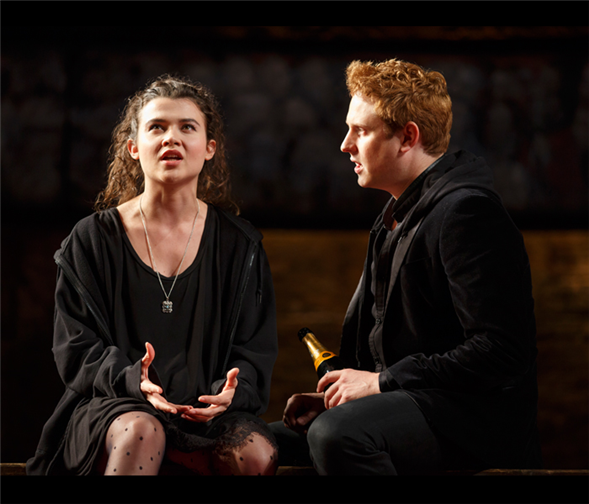Translate Page

The secrets of the language in Broadway's King Charles III
---
Welcome to Building Character, TDF Stages' ongoing look at actors and how they create their roles.
If a script is written in verse, then a playwright has essentially built instructions into an actor's lines. Just ask Richard Goulding, who's starring as Prince Harry in King Charles III, a play from Mike Bartlett that imagines Charles's ascent to the throne after Queen Elizabeth II dies.
Now on Broadway at the Music Box Theatre, the show is one of the few contemporary verse dramas. Most theatregoers encounter the form through Shakespeare, whose plays are written in iambic pentameter, meaning the lines are ten syllables long and use an unstressed-stressed rhythm. ("but SOFT what LIGHT through YON-der WIN-dow BREAKS.") Therefore, since Bartlett uses iambic pentameter as well, his modern words and phrases may still sound Elizabethan to our twenty-first century ears.
For Goulding, this sound dictates how he shapes his character. "With a prose play, an actor makes a decision about what they're doing and to some extent imposes those decisions onto the text and how they see the character," he says. "But with verse, everything is written down on the page. Everything the character is comes from what they say, and the rhythm and structure of what they say defines how they say it. It's not so much about an actor making decisions; it's about an actor allowing the text to transform them into what the play demands."
Bartlett's text, for instance, demands that Prince Harry should be a thorn in everyone's side. The central action involves King Charles's refusal to condone a bill that would limit the freedom of the press, and the resulting firestorm forces everyone to choose sides between a democratically elected parliament and a monarch who clearly loves his people. In the midst of this, Harry decides he wants to drop his royal title so that he can run away with a rebellious young woman. The love affair liberates his mind and heart, but once the tabloids get wind of his girlfriend's past, it becomes a flashpoint for the royal family's internal battle over what the press should be able to do.
Harry prefers an antagonistic stance, and as Goulding points out, that's obvious from the moment he speaks. "Everything has been in verse until Harry enters the first time," he says. "Harry's line is, 'I might head off, if that's okay.' Until then, everyone has been speaking about how nice the funeral for the queen was and how well it went. It's all in fairly stately verse, and then Harry comes in and completely cuts through it with a totally different rhythm.
"It's a prose rhythm, which is funny. And it's not because of what I'm doing, although I can flatter myself and say that it is. It's entirely, I believe, because of the writing. It tells us something about who Harry is in relation to what's going on."
Similarly, we can use language to track how Harry changes, evolving from a kneejerk rebel to a man who's deeply divided about how he should participate in his country's life. Take a scene where Harry and Prince William argue about the family's future. At one point, Harry says, "We have done things that most do ev'ry day/ but I assumed were not within my compass."
Notice that the second line has 11 syllables, not 10. For Goulding, that’s a meaningful deviation. "The word 'compass' is probably not a word that Harry would say ordinarily," he explains. "But he's in this verse mode where he's talking to William, and he's angry and frustrated. And that word has some extra bite to it, some extra passion. Harry is becoming more invested in things here.These little details tell you something about what the writer wants from the scene."
Plus, when language operates in such a highly formalized way, it reminds us that the story we're watching isn't "realistic." King Charles III may begin with actual people and actual British customs, but it quickly encompasses bigger themes. "The verse immediately takes it into a metaphorical place," Goulding says "It's not 'every day.' It's not 'normal.' It's heightened and imaginative, and it's bigger than real life. It departs from reality just enough to allow these metaphors to come across."
---
TDF Members: We've recently offered discounted tickets to King Charles III. Log in now to see all your available shows.
Follow Mark Blankenship at @IAmBlankenship. Follow TDF at @TDFNYC.
Top photo -- of Tafline Steen and Richard Goulding. Middle photo by Joan Marcus.